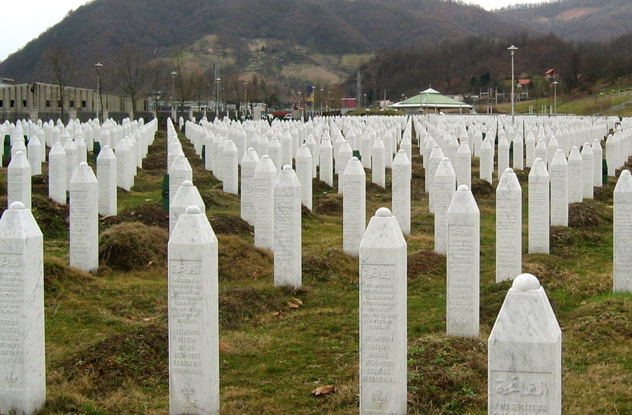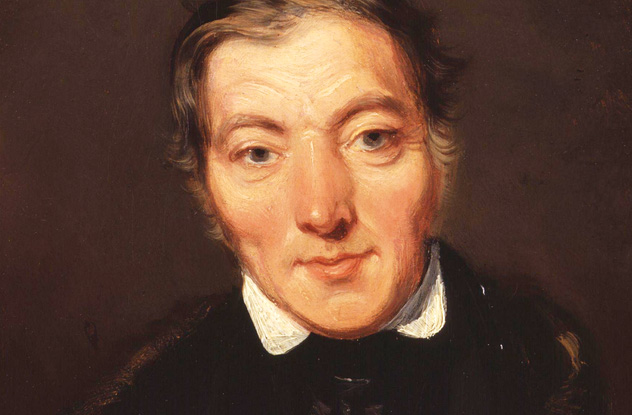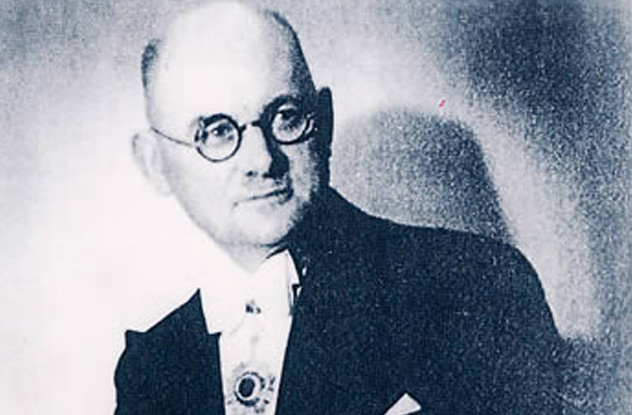 History
History  History
History  Weird Stuff
Weird Stuff 10 Wacky Conspiracy Theories You Will Need to Sit Down For
 Movies and TV
Movies and TV 10 Weird Ways That TV Shows Were Censored
 Our World
Our World 10 Places with Geological Features That Shouldn’t Exist
 Crime
Crime 10 Dark Details of the “Bodies in the Barrels” Murders
 Animals
Animals The Animal Kingdom’s 10 Greatest Dance Moves
 Movies and TV
Movies and TV 10 Box Office Bombs That We Should Have Predicted in 2025
 History
History 10 Extreme Laws That Tried to Engineer Society
 History
History 10 “Modern” Problems with Surprising Historical Analogs
 Health
Health 10 Everyday Activities That Secretly Alter Consciousness
 History
History 10 Dirty Government Secrets Revealed by Declassified Files
 Weird Stuff
Weird Stuff 10 Wacky Conspiracy Theories You Will Need to Sit Down For
 Movies and TV
Movies and TV 10 Weird Ways That TV Shows Were Censored
Who's Behind Listverse?

Jamie Frater
Head Editor
Jamie founded Listverse due to an insatiable desire to share fascinating, obscure, and bizarre facts. He has been a guest speaker on numerous national radio and television stations and is a five time published author.
More About Us Our World
Our World 10 Places with Geological Features That Shouldn’t Exist
 Crime
Crime 10 Dark Details of the “Bodies in the Barrels” Murders
 Animals
Animals The Animal Kingdom’s 10 Greatest Dance Moves
 Movies and TV
Movies and TV 10 Box Office Bombs That We Should Have Predicted in 2025
 History
History 10 Extreme Laws That Tried to Engineer Society
 History
History 10 “Modern” Problems with Surprising Historical Analogs
 Health
Health 10 Everyday Activities That Secretly Alter Consciousness
10 Acts Of Kindness From Those On The Wrong Side Of History
Even in its darkest moments, history is awash with heroes. The men and women of the French Resistance, the civilians who sheltered Tutsis in Rwanda, the people who marched for civil rights in the 1960s . . . all of them are rightfully celebrated today for helping shape a better world.
But not every act of heroism comes from the “good guys.” Just occasionally, people with the bravery and strength of character to be heroes wind up on the wrong side of history. And they still had it in them to do the right thing.
10The Hungarian Nazi Who Saved Jewish Lives

On paper, Zoltan Kubinyi seems like more like a fictional character than a human being. A Hungarian Nazi officer who just happened to be a Seventh Day Adventist and conscientious objector, he refused to carry a gun even when overseeing forced labor battalions. While a story might end with Kubinyi getting overthrown by his prisoners, real life had something much more touching in store.
From the moment he took over the local labor camp, Kubinyi was letting his humanity shine through. Where other Nazis abused their charges, he allowed them to observe Jewish holidays, even fasting alongside them on Yom Kippur. Where other camp commanders let the weak starve to death, he sneaked them extra rations. But the best part came when Kubinyi got orders from Nazi high command to ship his prisoners to the gas chambers. As the Third Reich disintegrated around them, Kubinyi marched his men into Hungary and tried his best to hide them from other Nazis.
It wasn’t easy. At one point, a group of Hungarian policemen identified the men as Jews and prepared to ship them to Germany, only for Kubinyi to ply them with alcohol and get his men away while the policemen slept. He got them to a town occupied by the Red Army, saving their lives.
We wish we could tell you the story ended there, but there’s one last act. Despite his work in rescuing Jewish prisoners, Kubinyi was arrested by the Russians and deported to Siberia, where he died in undeserved anonymity. Today, he is listed as Righteous Among the Nations for allowing his humanity to triumph.
9The Anonymous Serbs Who Saved Their Muslim Neighbors

In July 1995, Bosnian-Serbian troops rolled into Srebrenica, a tiny enclave of peace in the nightmare of the Balkan Wars. What followed was the worst civilian massacre in Europe since World War II. Over 7,000 Muslim boys and men were executed, with Serb forces shelling survivors as they fled. Yet even in this moral wasteland, tiny flickers of humanity could still be found.
One such flicker came courtesy of an anonymous Serb soldier identified 10 years later by the New York Times. Ordered to remove elderly Muslim men from a group of female refugees for later execution, he came across two neighbors who had treated him kindly as a boy. Defying a direct order from his commanding officer, he allowed the two to stay with the women. As a direct result of his intervention, the two men survived while nearly all others died.
Such interventions weren’t limited to Srebrenica. In the town of Brcko, a Serb police officer identified in a Slate article only as “Pero” saved a local Muslim family he knew from a concentration camp by forging official papers. He did this not once but twice before finally deserting the Serb forces after the family escaped the country.
Go looking for them, and you’ll find dozens of similar stories, like this one about a Serb who sacrificed his own life to save a Muslim friend.
8The Slavers Who Became The Earliest Emancipators

The slave-owning plantations of the South were inhuman. Slaves were tortured, abused, and sometimes left to starve to death. Yet not every slave-owner was a Calvin Candie clone. Among the legions of scumbags were a precious few who came to see the error of their ways.
Chief among them was Robert Carter III. A wealthy Virginia plantation owner, Carter got rich off slave labor but experienced an unexpected change of heart. In the 1770s, he and his wife spontaneously decided to free their slaves.
It was an impossibly strange decision for the time, and Carter seemed to recognize this. Facing pressure from his pro-slavery sons-in-law and neighboring plantation owners fearing a statewide rebellion, he limited himself to freeing a total of 15 slaves each year. In some cases, this meant a slave could wait over 50 years to be freed.
Despite the slowness of his operations, and despite evidence that he did it simply to make his life less complicated, Carter’s actions still smack of decency. Unlike other former owners, Carter didn’t overcharge his freed slaves to lease land or burden them with debt. He also wrote a specific stipulation into his will that stopped his sons-in-law from undoing his good work after he died.
He wasn’t the only Southerner to act this way. In South Carolina, Rev. William Henry Brisbane had a Damascene conversion in the 1830s and moved North, freeing his slaves. He then became an ardent abolitionist, even though these actions left him in near-poverty. In Britain, former slaver John Newton turned his back on his trade and became one of the leading lights of the abolition movement.
7The Anti-Apartheid Afrikaners
As the architects of South African apartheid, Afrikaners are today widely associated with racism. Although a whites-only referendum eventually brought down minority rule, many assume (in some cases correctly) that this was due to international pressure. Yet several Afrikaners made it their life’s mission to create an integrated South Africa.
Most prominent was Frederik van Zyl Slabbert. Son of conservative, pro-apartheid parents, he nonetheless grew up to become one of the government’s biggest critics. In 1985, he publicly resigned from office over a crackdown on black activists. In 1987, he led a white delegation to Senegal to meet the ANC leadership. This move branded him a traitor back home.
Some went even further. Former Afrikaner nationalist Bram Fischer defended Nelson Mandela in court and served life in prison for his anti-apartheid activities. Others courted censorship and emergency laws for publishing anti-apartheid newspapers in Afrikaans or attending demonstrations. Although most of their stories are today forgotten, they were a key part in helping Mandela win his decades-long struggle.
6The Moderate Hutus Against Rwanda’s Genocide

Over the course of 100 days in 1994, ethnic Hutus in Rwanda slaughtered between 800,000 and one million Tutsis, a killing spree more efficient than the Holocaust. You’ve probably heard of Paul Rusesabagina, the Hutu who saved thousands of lives by turning his hotel into an impromptu refugee camp. What you might not know is that he wasn’t alone. Even as the country fell into a vortex of violence, dozens of Hutus risked life and limb to save their Tutsi neighbors.
In the countryside, elderly Hutu Sula Karuhimbi turned her farm into a haven for 20 Tutsis fleeing the violence. When the death squads came knocking, she marched straight out, declared she was a witch, and threatened to bring down a hideous curse on anyone who came on her property. Incredibly, this desperate bluff worked, and militias spared her farm. Elsewhere, a man known only as Yahaya risked his whole family’s life to shelter a single Tutsi girl, openly defying the local death squads by quoting the Quran at them. Others personally walked refugees all the way to Zaire, traveled into the midst of the killing fields to deliver medical supplies, or even tried to arrest the death squad leaders.
Although many were murdered for helping their neighbors, between them, they saved many thousands of Tutsis. Today, whole families are alive because of their efforts.
5The Former FARC Guerrillas Clearing Colombia’s Land Mines
Since 1964, the Colombian state has been fighting a three-way civil war against leftist rebels, FARC, and extreme-right paramilitaries. All three sides have been accused of war crimes, with FARC’s land mines and the paramilitaries’ murder of journalists being only the most prominent. Yet even as the war drags on into its 51st year, there are some signs of hope. A small group of FARC guerrillas are now trying to clear the country of the very explosives they helped to plant.
Headed up by former child soldiers, the movement has become so popular that even active FARC members are now joining its ranks. Working without maps, the rebels are entering fields known to be mined and are personally removing the improvised bombs, which are typically made from metal cans and stuffed with syringes. It’s grueling work, but it’s already making a difference. The Colombian government is considering using the group’s work as a pilot for a national, post-conflict scheme. With an estimated 800,000 Colombians at risk from land mines on a daily basis, their work has the potential to save thousands of lives.
4The Anti-Fascist Sudeten Germans

Even by 1930s standards, the Sudeten Germans were notably fascist. A group of three million Germans living in an area of Czechoslovakia known as the Sudetenland, they were extremely pro-Nazi. When Hitler rolled into the area in 1938, they lined the streets to cheer him on. Under the Third Reich, they helped exterminate some 300,000 Czechs. Yet even among this group, a handful still risked everything to oppose the German state.
Chief among them were the Sudeten communists. Violently opposed to Hitler’s fascist state, these ethnic Germans worked with Moscow to distribute anti-Nazi propaganda at a time when such activities could earn you a one-way ticket to the nearest death camp. Although the propaganda probably had little effect on the war’s outcome, it showed that a small number of the Sudeten Germans had the courage to stand up to the Nazi war machine.
Brave as it was, this pales against the activities of the most famous Sudeten German of all. In 1935, Oskar Schindler had been a fervent Nazi, spying against the Czechoslovak state for Berlin. By 1942, he was working desperately to save Jewish lives and sabotage the Nazi war effort, a change of heart that inspired one of the most notable war films of all time.
When the war ended, most of these Sudeten anti-fascists were violently expelled from Czechoslovakia along with the pro-Nazis. Today, their fate remains a sticking point between German and Czech relations.
3The Factory Owner Who Helped Britain’s Poor

During the Industrial Revolution, most of Britain’s factories and mills were places of utter misery. Children were used as slave labor, adults were forced into slums, and the average factory owner was a Dickensian stereotype. With the exception, that is, of Robert Owen. A Welsh capitalist who took over the New Lanark cotton mill in Scotland in 1799, Owen was determined to create a utopia for his workers.
Under Owen’s control, the New Lanark mill put into practice policies a century ahead of their time. Workers had access to free nursery care, and children received a formal education 70 years before the UK introduced compulsory schooling. Housing was subsidized and cleanliness was encouraged, leading to an utter absence of the slums that sprang up around every other mill or factory.
Best of all, Owen even moved to smash the much-hated truck system. Since the 16th century, the truck system paid employees in tokens that could only be spent at the company store. The company then charged exorbitant rates for merchandise, keeping workers poor. Under Owen’s stewardship, the New Lanark store sold items on at little more than wholesale cost, so workers rarely wanted for anything. Far from being a stereotypical industrialist, Owen improved the lives of hundreds of ordinary people.
2The Good Nazi Who Saved A City

We’ve briefly mentioned John Rabe before, but his inspiring story deserves a closer look. Hitler’s man in Nanking when the city fell to the Japanese army, Rabe was an ardent Nazi steeped in eugenics theory. This only makes his actions more exceptional. Faced with a rampaging Imperial Army hacking Chinese civilians to death with machetes, Rabe quietly decided to put his ideology to one side and become a hero.
Although ordered to leave the city for his safety, Rabe instead assembled a loose group of a dozen German and American expats and charged them with creating an “international zone.” As the Japanese troops raped and looted their way across Nanking, he and his group set about protecting the 250,000 Chinese who fled to the zone. Without even so much as a pistol to defend himself with, Rabe patrolled the city’s streets, facing down gangs of soldiers and stopping them from raping women. He dug foxholes in his own garden and sheltered another 650 civilians there. He kept this display of courage up for four whole months.
By the time the Japanese left, Nanking was in ruins. Thousands had died. But the international zone had pulled through. It’s thought today that this staunch supporter of Hitler may have saved as many as 250,000 lives. Although he was arrested as a Nazi loyalist after the war and died in misery, he has an especially fitting tribute today: A whole generation of children in Nanking are named “Rabe.”
1The Forgotten Chinese Soldiers

After what we’ve just read about Nanking, it might seem incredible to think Chinese soldiers who fought the Japanese could have been on the wrong side of history. For that, you can thank the Chinese Civil War.
A series of intermittent battles between the nationalist KMT and the Communist CCP, the Chinese Civil War blew up in 1927 and lasted right up until the Japanese invaded. With a common enemy now occupying their cities, the KMT and CCP joined forces until the end of World War II. At that point, they went right back to killing each other. Things only ended with the rise to power of Chairman Mao and the mass exodus of the KMT to Taiwan, where they set up their own government. Unfortunately, several their members got left behind.
Today, the surviving KMT soldiers in China are in a strange position. Despite having fought the Japanese at every turn, despite having lost limbs defending their country, and despite having saved countless civilian lives, they’re considered a source of shame by the government. Robbed of pensions, their names nowhere to be found on commemorative plaques, they instead grow old and die tucked away from public sight. Many of them still carry the label of war criminals, a status forced on them during the Communist Cultural Revolution that tried to stamp out all remaining KMT support. Those who avoided that fate often choose to remain anonymous, scared of digging up their nationalist past.
The result is a whole class of soldiers who fought the Japanese in World War II but have now been scrubbed from history. In its own sad way, that might be even worse than being remembered for fighting on the wrong side.





![9 Sinister Facts About The Dark Side Of Instagram [WARNING: Disturbing] 9 Sinister Facts About The Dark Side Of Instagram [WARNING: Disturbing]](https://listverse.com/wp-content/uploads/2019/10/proxy.duckduckgo-150x150.jpg)


